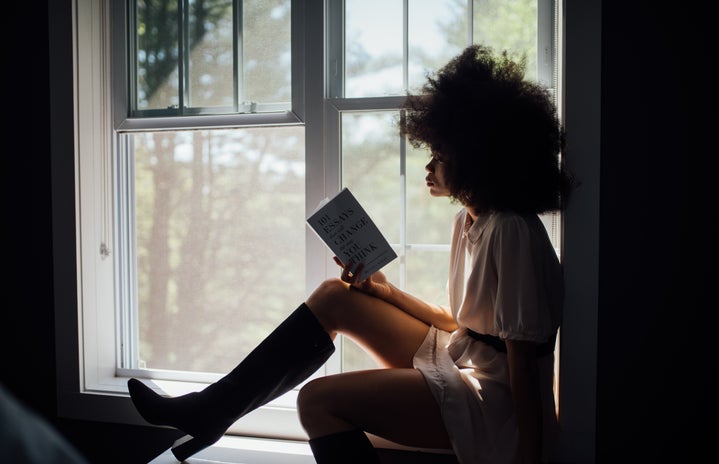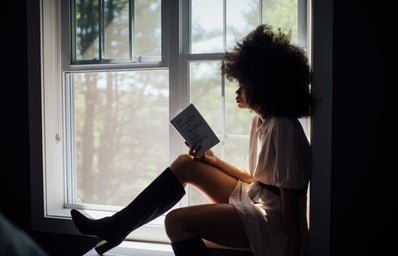As an avid reader and student of Comparative Literatures and Cultures (don’t ask, I’ve had to explain my degree at every pre-drinks ever), I love expanding the literature I consume. Recently, I noticed that many of favourite novels are by Black female writers. In celebration of Black History Month, I wanted to give these amazing Black writers centre stage.
Chimamanda Ngozi Adichie
Chimamanda Ngozi Adichie’s Half of a Yellow Sun, recommended by my college literature teacher, immediately transported me to the Biafran war, a Nigerian civil war that previously I knew next to nothing about.
Transfixed by Adichie’s deeply psychological character development, I picked up her classic novel Americanah (2013) and was definitely not disappointed. Adichie captures the subtle racism that her main character, a Nigerian woman living in America, experiences on a daily basis. I am now keen to explore Adichie’s non fiction feminist books, such as We Should All be Feminists (2014).
CANDICE CARTY-WILLIAMS
For a lighter read, Candice Carty-William’s ‘comic debut’, Queenie (2019), is a book I recommend to absolutely everyone, similar to the famous Everything I Know about Love (2018), in that it follows the struggles of a woman in her twenties, highlighting the simultaneous power and complexity of female friendship.
It touches on the stark truths about racism in online dating, fetishisation and gentrification in South London. I am a fan of Carty- William’s’ comic, yet realistic, portrayal of casual sex, following Queenie’s series of disastrous hook ups (which, as uni students, we find it easy to sympathise with and relate to).
For anyone else with a slight podcast obsession (ashamed to admit it but I’m always up to date with ‘The Girls Bathroom’), ‘Growing Up with gal-dem’ is a favourite. The two hosts, Natty Kasambala and Niellah Arboine invite different guests to respond to old diary entries, texts messages or letters from their younger selves. This podcast has taught me about passport privilege (Georgina Lawton’s interview), Candice Carty- Williams’ struggles with mental health and, why she’s over being ‘the strong friend’, Elizabeth Lee’s experiences as an East Asian woman and how she was able to find solidarity in interracial friendships.
TONI MORRISON
What would a list of amazing black female writers be without mentioning Toni Morrison? My mum raised me in a house filled with dusty paperback copies of Toni Morrison books and always encouraged me to read them. The Bluest Eye (1970) and Sula (1973) are both eye opening and complex stories. Although her books are difficult, don’t be put off.
Even if you’re reading them for fun, I suggest sparknotes for some extra context and to help understand some of the more complex themes. The Bluest Eye discusses themes which are still prevalent today, such as the Western beauty standard of whiteness and how harmful this can be. The naive narrator also makes it a super interesting read. As I have said already, female friendship is my favourite topic to read about, so Toni Morrison’s book Sula, about two best friends Sula and Nel and their bond, is another one to look out for.
BRIT BENNET
Contemporary American writer Brit Bennet’s recent novel The Vanishing Half (2020) grapples with what it means to be ‘white-passing’, and how this affects Black people’s perspectives of their own identities. The writer explores the lives of two African American twin sisters in late 1960s America.
In this story, one sister chooses to pass for white, while the other does not. On one level, this story is full of inventive twists and complex family dynamics, but it is also a poignant commentary on American history and the idea of ‘passing’.
ZADIE SMITH
Finally I’d like to talk about, Zadie Smith, the daughter of a Jamaican mother and an English father. She is known for her eccentric characters, savvy humour and snappy dialogue. Her novel On Beauty (2005) is on my to-read list; it follows the lives of a mixed race British and/ American family living in the USA and the UK, exploring the cultural differences and the clash between liberal and conservative values.
What I love most about these writers is the way their female protagonists stay with me; Olanna, Ifemelu, Queenie, Pecola Breedlove, Stella and Desiree. Weeks after finishing these novels, I was analysing Ifemelu’s love life, Queenie’s relationship with her mum and the complexities of Stella and Desiree’s twin relationship. Their ability to touch on social and racial issues throughout their novels whilst creating complex, believable and completely lovable female characters is unique.


